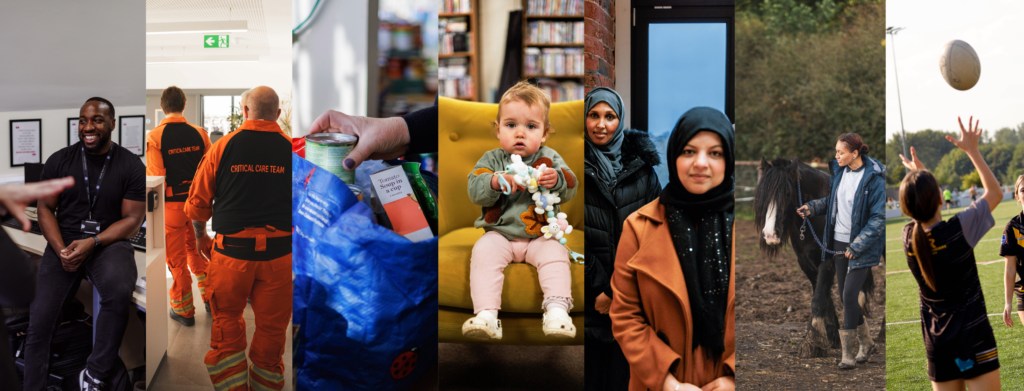
A CEO’s view on buying property to tackle homelessness
More than 160,000 people in London don’t have a home. The rates in Newham are particularly stark, with one in 24 people classed as homeless. First Fruit is working to change that, one person at a time.
First Fruit is a family of charities offering support for disadvantaged people in Newham. First Fruit Group of charities offers accommodation for two groups of people – single homeless men who are able to access benefits, and single mothers who cannot access public funds due to their immigration status.
The charity recently bought one of its hostels with a Charity Bank loan of £400,000. Commercial banks had refused to grant a loan without the charity making significant changes, as CEO Christina Baby explains:
Why did you need the loan?
We’d been renting a house on Cumberland Road for over 15 years. The landlord had let us have it for a very low rent, but he wanted to sell up. We’d raised enough money to buy another of our houses, so took a mortgage out on that one in order to buy the one on Cumberland Road.
Why did you choose Charity Bank for the loan?
We stumbled across Charity Bank and decided that we’d rather work with them than a high-street bank. They understand our ethos; they can see what we’re trying to do.
Commercial banks seem to be scared of dealing with charities. We’re an incorporated charity. The commercial banks we talked to wanted the trustees to give a personal guarantee. That’s ridiculous, no one would do that! Charity Bank accepts charities as charities.
Without their help, I would have had to watch the house on Cumberland Road being sold into the privately rented sector. Where would our tenants have gone?
Did you have any concerns about taking out the loan?
Not really.There’s a high need in Newham – one in 24 people is defined as homeless. There’s no problem filling the place, which means there’s no problem paying back our loan.
I believe you’ve grown considerably in the last few years?
Yes, from one property to seven. We took the first property on from another charity that was struggling, and it grew from there. Today, we have 48 bed spaces for single men and 12 for single mothers.
What made you decide to target single mothers who can’t access benefits?
About 10 years ago, the Home Office started really cracking down. It tightened the employment laws, so many women who didn’t have leave to remain in the UK ended up being pushed into prostitution. Plus, landlords had to see proof of residence before letting a property out, which meant these women couldn’t find anywhere decent to live either. Mothers were having their babies taken away, because the state has a duty of care towards the baby but not towards the mother.
First Fruit’s co-founder, Hannah Watherston, started taking some of these new mothers into her home. Then she managed to rent a property for them, and it grew from there.
Do you also help the women to seek asylum?
Yes. We’ve got ‘indefinite leave to remain’ granted for every woman we’ve had through our doors since 2008. The first case took six years, but now we can turn it around much quicker. We have a network of local agencies we can go to for support and together we make it happen.
And how do you help to support the men to break the cycle of homelessness?
A lot of homeless people will go to a hostel, drink, sleep around, and move from one space to the next. They have no support to do more with their lives. We asked, “How can we break this cycle?” The answer? With a culture of employment. Breakfast is 8am–9am and the men have to be out of the house by 10am. They can’t return until 2pm. It works wonders. It gets people back into a day/night pattern, and self-regulates late night drinking.
If people have at least one good meal a day, there’s a much higher success rate of getting them away from alcohol and drugs, so we provide the men with a good home-cooked meal every evening.
Decent personal hygiene is vital when it comes to getting a job. We give people toilet rolls and two free uses of the washing machine a week. Everyone gets a starter pack with new linen, a bowl, plate etc. The men who are most in need are also given things like deodorant, towels, shaving supplies, clothes and so on. I had someone visit from the council the other day and he said that ours is the one hostel where you can’t tell the difference between staff and residents.
We also offer training opportunities and work placements, and every resident has to spend two hours per week cleaning kitchens, bathrooms, communal areas and so on. There’s also a strict no-bullying rule.
All of this lifts spirits, and gives people hope. We celebrate when someone gets a job. It makes the others think, “Maybe I could do that.”
How did you find the process of applying for the loan?
It’s a stringent process, but it needs to be because otherwise the chances are you’d end up defaulting further down the line. So, while it was hard, I was happy to go through it. The deposit is the difficult bit – it’s a lot of money for a charity to raise.
What worked particularly well?
Our business support manager is wonderful! He came over and spent a whole afternoon talking with us. It was our first time doing something like this, so talking helped things to fall into place. And when issues have come up along the line, we’ve discussed them and agreed what to do.
Do you have any plans to change the property now that you own it?
We were planning to build an extension and convert the loft for both of the houses that we own. That would probably give us another four rooms in total. But now we’re thinking that if we can find that amount of money, we’d be better off spending it on a deposit for another house. That way we’d get seven or eight extra rooms, rather than four.
We currently own two properties and rent five. We want to buy them all eventually though, so we’re working to save enough money for the next deposit, and are hoping Charity Bank will help us with another loan. Right now, we’re at the mercy of our landlords.
Read our case study on First Fruit
About Charity Bank
Charity Bank is the loans and savings bank owned by and committed to supporting the social sector. Since 2002, we have used our savers’ money to make more than 1380 loans totalling over £580m to housing, education, social care, community and other social purpose organisations.
Nothing in this article constitutes an invitation to engage in investment activity nor is it advice or a recommendation and professional advice should be taken before any course of action is pursued.


